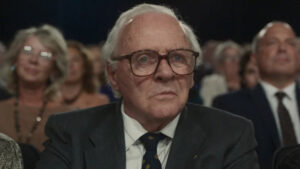
Last year, in reviewing “Armageddon Time,” I said that hiring Anthony Hopkins to play the patriarch of a Jewish family in Queens, New York, was the worst casting decision I’d seen in a long time.
Now, Hopkins is back, playing another Jewish man named Nicholas Winton. But this time, the casting works, because both Winton and Hopkins are British — and the actor looks just like the real-life man he’s portraying.
Winton was a stockbroker in London during World War II. In December, 1938, as Hitler was beginning his murderous march across Europe, Winton got a call from some friends in Prague who needed help with their charity, which offered aid and assistance to Czech refugees. He stayed for a month, witnessing the impact the German attacks were having on the city and its citizens, especially kids. That led him to begin a campaign to save children by moving them to England by train.
To accomplish this, he had to convince British couples to be foster parents, get government officials at both ends to extend visas to the children, and pay for the rail tickets, too. It was an enormous undertaking, which Winton did not do entirely on his own. As he said, it took an army of ordinary people, but he led the cause with his slogan: “Save One Life, Save The World.”
The movie contains heartbreaking scenes of Czech families waving goodbye to their children as they depart on trains to England, not knowing if they will ever see each other again. Very few did, because so many were slaughtered in Nazi concentration camps, leaving the children fortunate enough to be saved by the kindertransport as the only members of their families who survived.
“One Life” is based on a biography of Winton by his daughter, Barbara, who was one of the producers and co-writers of the film. It has a marvelous supporting cast, including Johnny Flynn as the younger Winton and Helena Bonham Carter as his mother, who was instrumental in his cause. Later, Lena Olin plays Winton’s wife and Jonathan Pryce plays an old friend who worked with him to save refugees.
As for Hopkins, he’s fascinating to watch even when he’s merely sitting in a chair thinking and adjusting his glasses. It’s not a showy performance at all, which fits Winton’s personality perfectly. After World War II, he never talked about what he’d done until the British TV show, “That’s Life,” told his story fifty years later, in 1988. As other media outlets picked up the details, he became known as the British Oskar Schindler.
A clip of that profoundly moving episode has been on YouTube for several years, and is recreated perfectly in the film. The first time I watched it, I hoped some filmmaker would bring it to the screen. Now, thirty-five years later and over eighty years since the original chain of events played out, director James Hawes and co-writers Lucinda Coxon and Nick Drake have done a fine job of revealing Winton’s brave perseverance to the world.
I was deeply affected enough by “One Life” to recommend it with a rating of 8 out of 10. Opens today in theaters.
